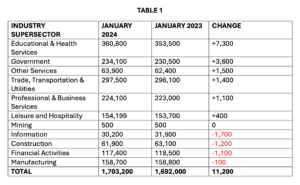Over the past year, Connecticut’s labor market added 11,200 new positions across its industry supersectors, increasing the total payroll jobs to 1.70 million — a 16-year-high, according to the state’s Department of Labor (DOL) annual benchmark report.
The achievement was boosted by gains in Educational and Health Services; Government; Trade, Transportation and Utilities; Professional and Business Services; Leisure and Hospitality; and Other Services. These sectors offset losses in Manufacturing; Financial Activities; Construction; and Information. (See Table 1 Below for Exact Numbers)
While the growth in several supersectors is encouraging, it should be noted that gains in ‘Government’ are not exactly a cost-benefit since the positions require taxpayer dollars to exist in the first place, which counteract private sector increases and deplete residents’ disposable income.
Nevertheless, last year was monumental in that Connecticut recovered and then exceeded the number of jobs lost (-291,100) due to the Covid-19 lockdowns from March to April 2020 by 101.6% in total and 102.9% in the private sector. Additionally, the state finally surpassed the number of people employed in the private sector prior to the Great Recession in 2008.
“We have stable and sustained job growth, an increasing labor force participation rate, and we have, so far, weathered the impacts of COVID variants, supply chain disruptions, inflation, and the possibility of a recession,” DOL Commissioner Danté Bartolomeo stated in a press release. “Connecticut’s economy is in good shape and poised to continue growing.”
The annual benchmark report coincided with an account of January 2024’s job numbers, which also experienced growth, adding 7,400 new jobs in six of the ten state supersectors. (See Table 2 Below for Exact Numbers)
While the positive trends are certainly worthy of celebration, the latest report does not necessarily indicate Connecticut’s labor market is on the cusp of becoming an economic powerhouse. Gov. Ned Lamont even told Connecticut job creators that the state “still has a long way to go” in remedying past financial issues at the Connecticut Business and Industry Association’s (CBIA) Economic Summit + Outlook 2024 conference on Jan. 18.
To be sure, the Constitution State fared better than most of our New England neighbors in the number of jobs added apart from Massachusetts, and unsurprisingly fell behind other more-populated regional players such as New York, Pennsylvania and New Jersey. However, Connecticut finished at the bottom in terms of a percentage increase in the workforce. (See Table 3 for Exact Numbers from the U.S. Bureau of Labor Statistics)
Still, groups like AdvanceCT believe Connecticut is a “premier destination for businesses, large and small,” yet my colleagues President Carol Platt Liebau and Director of Policy David Flemming suggest this assertion is “premature,” as they recently wrote in the Hartford Courant. Yet it’s not only them cautioning optimists on the state’s economic ascendancy. Other outlets agree, including:
- Forbes who in its “Best States to Start a Small Business in 2024,” ranked Connecticut 30 out of 50;
- The Tax Foundation’s “State Business Tax Climate Index,” the most comprehensive tax ranking, ranked the state 47th best ten years in a row from 2014-2024; and
- Wallethub, who ranked Connecticut 49th on its “Best States to Start a Business.”
Those conditions may worsen if progressive lawmakers pass restrictive regulations during the legislative session. As Liebau and Flemming state, “We have a legislature that too often seems unaware of the challenges of running a business — while constantly creating new tax and regulatory proposals that make it more expensive for a smaller enterprise to operate.”
They added, “This year, some are pushing mandated paid sick time for small businesses; last year, there were bills requiring 30 hours of paid leave for employers with a workforce of 11 or more (and 40 hours of unpaid leave for those with 10 or fewer workers). They even dictated part-time benefits.”
Additionally, the rose-colored outlook cannot be squared with larger employers leaving Connecticut. Last year, both the LEGO Group and Frontier Communications announced plans to move their corporate headquarters to Boston, Mass., and Dallas, Texas, respectively. Collectively, this impacted more than 1,000 employees.
Recent news has also been discouraging. At the beginning of this year, several employers with 100 or more-full time employees have told the state they will be laying off hundreds of workers, including Cascades Containerboard Packaging in Newtown (71), Freight Handlers, LLC in Manchester (383), and UPS in Windsor (118), according to the DOL Worker Adjustment and Retraining Notification (WARN).
In short, 2023 certainly had positive movement in the labor market, but also multiple shortcomings regarding over-regulation and taxation, and several large employers emigrating elsewhere.
Yet the negative ratings by national outlets should not lead one to despair. It is encouraging to see state lawmakers, like Gov. Lamont, who are actively working toward budgetary responsibility by protecting the 2017 bipartisan fiscal guardrails; passing an income tax cut for the middle class; and marketing Connecticut as a hub for industry through the “Make It Here” campaign.
This session poses a great opportunity for the General Assembly to lay the groundwork for businesses to thrive; but, as already mentioned, there are also ample pieces of legislation that could prove detrimental to 2023’s gains. Lawmakers must choose free-market options instead of burdensome regulations. Otherwise, how will small-to-medium-sized businesses ‘make it’ here in 2024 and beyond?




